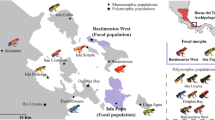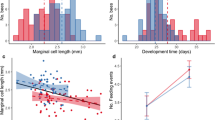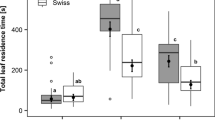Abstract
Following mating, female bushcrickets undergo a refractory period during which they are sexually unreceptive. The length of the refractory period correlates with the size of the spermatophylax. However, the size of the nuptial gift of acoustically signalling bushcrickets is often reduced as a result of infections by parasitoid flies. We examined the effect of male parasitoid infection on the induction of the refractory period and fecundity of females. We found a drastically reduced refractory period in females if the first mating partner was infected. During this shortened period fewer eggs were deposited, as an effect of the shorter refractory period, whereas the daily egg-laying rate remained the same regardless of whether the females were mated with a parasitized or an unparasitized male.
Similar content being viewed by others
Author information
Authors and Affiliations
Additional information
Received: 17 July 2000 / Accepted in revised form: 4 August 2000
Rights and permissions
About this article
Cite this article
Lehmann, G., Lehmann, A. Female bushcrickets mated with parasitized males show rapid remating and reduced fecundity (Orthoptera: Phaneropteridae: Poecilimon mariannae). Naturwissenschaften 87, 404–407 (2000). https://doi.org/10.1007/s001140050750
Received:
Revised:
Accepted:
Published:
Issue Date:
DOI: https://doi.org/10.1007/s001140050750




